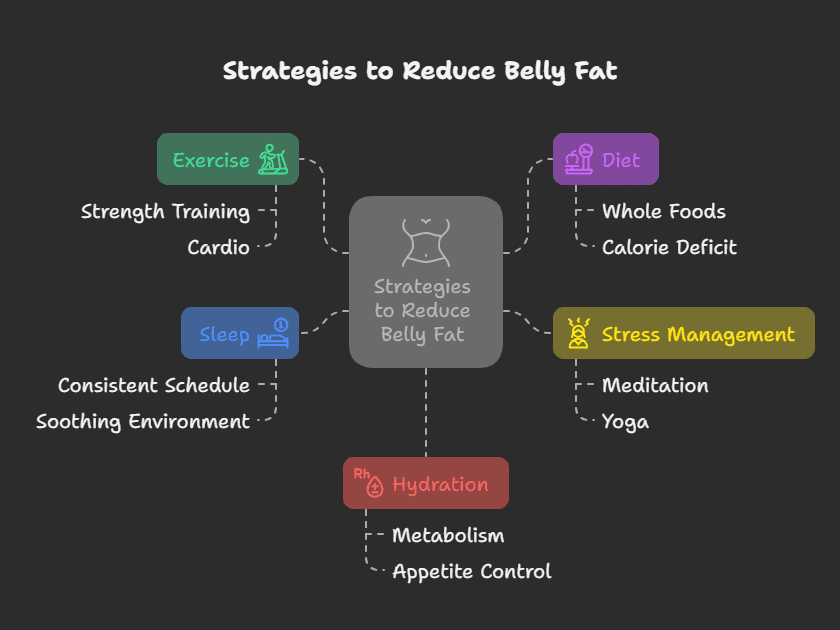Belly fat isn’t just an aesthetic issue; it’s linked to serious health conditions like heart disease, type 2 diabetes, and some cancers. Unfortunately, the web is full of misinformation and quick fixes that promise to burn belly fat overnight. In this article, we’ll debunk the most popular belly fat myths, tell you why they won’t work, and point you in the direction of evidence-based, sustainable solutions.
Myth 1: Spot Reduction Is Possible, Just Crunch More
One of the most enduring pieces of fitness folklore is that you can burn belly fat by targeting specific exercises like crunches or planks. This is called the spot reduction myth and has been thoroughly debunked by science.
When you exercise, your body burns fat from everywhere, not just the area you’re exercising. Fat loss happens evenly throughout the body, depending on genetics and hormones. Core exercises can tone the abdominal muscles, but won’t directly reduce the fat layer over them. Successful belly fat loss is dependent on overall fat loss through diet and exercise.
Myth 2: Fat-Burning Pills Will Melt Belly Fat
There are so many supplements that claim to burn fat easily. Most of these fat-burning pills have no science and have not been tested for safety. Research shows that over-the-counter weight loss supplements do not cause significant fat loss and are bad for your health. Some prescription drugs can help with weight loss, but have side effects and need to be taken under medical supervision.
Myth 3: Belly Wraps Trim You Down
Belly wraps are also promoted as gadgets to slim your waist and melt belly fat. But these wraps do nothing but temporarily trigger water loss through sweating and not fat loss. Any inch lost is temporary and comes back once you drink water again. There is no science to back up that belly fat wraps work in losing fat in the long run.
Myth 4: You Can Lose Belly Fat Fast with Fad Diets
Severe diets that claim to burn belly fat fast are unhealthy and unsustainable. Although you will see fast results, they might be due to water loss or muscle breakdown and not fat reduction. Plus, they will slow down your metabolism and cause nutrient deficiencies. The best and most sustainable way to lose belly fat is through a healthy diet with regular exercise.
Myth 5: More Cardio = Less Belly Fat
Cardio is good for overall health and can contribute to weight loss, but doing only cardio is not the best way to lose belly fat. Adding strength training to your workout increases muscle mass, which increases resting metabolic rate and fat burning. A combination of strength training and cardio is best for losing belly fat.
Myth 6: Missing Meals Leads to Losing Belly Fat
Missing meals can result in greater hunger and subsequent overeating later in the day, potentially leading to weight gain, including belly fat. Balanced, regular meals keep blood sugar levels stable and regulate appetite. Regular eating habits promote improved metabolism and energy levels, supporting effective belly fat loss.
Myth 7: Fat-Free Foods Are Best
Fat-free or low-fat foods are also seen as healthy foods. The foods may have added sugars and minimal nutrients, though. Healthy fats play an important role in hormone synthesis and nutrient uptake. Avocados, nuts, and olive oil are good sources of healthy fats and can contribute to good health and weight loss.
What Works: Evidence-Based Strategies to Reduce Belly Fat

- Combine Strength Training and Cardio
Add resistance training and cardio exercises to your exercise routine. Strength training will add muscle mass, raising your resting metabolic rate, and cardio will burn calories and improve your heart health. - Eat a Balanced Diet
Emphasize a whole foods diet that consists of fruits, vegetables, lean meats, whole grains, and healthy fats. Steer clear of processed meals and sugary drinks. Keeping a calorie deficit, eating fewer calories than you expend, is needed for fat loss. - Stress Management
Stress can result in elevated cortisol levels, which are linked to fat gain, especially around the midsection. Use stress-reducing methods like meditation, deep breathing, or yoga. - Sleep First
Target 7–9 hours of good-quality sleep at night. Bad sleep is associated with weight gain and excess belly fat. Set a consistent sleep schedule and establish a soothing sleeping environment. - Drink Hydrating Fluids
Consuming sufficient water facilitates metabolism and helps manage appetite. Swap sugary beverages with water to lower calorie consumption.
Final Thoughts
Losing belly fat isn’t so much about fad diets or spot training certain areas with specific exercises. It’s about adopting a holistic strategy that encompasses a healthy diet, routine exercise, stress control, and quality sleep. By dispelling such belly fat myths, you can target methods that work and result in sustainable, long-term health rewards.

















I believed all of this before, and recently realized this all are just myths